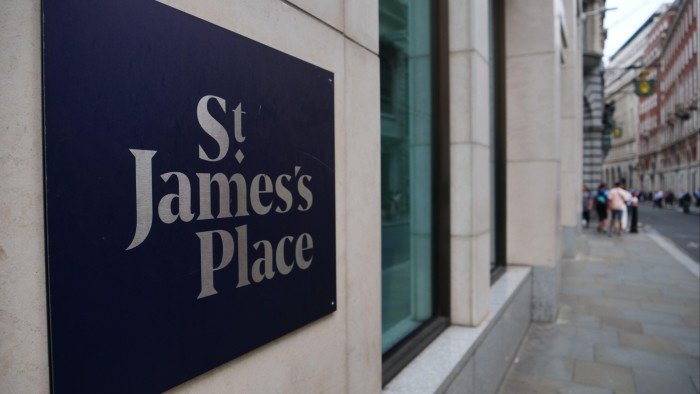Stay informed with free updates
Simply sign up to the Investments myFT Digest — delivered directly to your inbox.
St James’s Place has come under scrutiny for selling new customers products with exit fees, just days before it will scrap the charge due to consumer protection rules.
Consumer champions have warned that the UK’s largest wealth manager should reconsider selling pension and investment products that come with six-year early withdrawal charges as customers might be better off waiting until the fee is removed from August 26.
City activist Gina Miller, who has long campaigned for fairer fees in the industry, said: “The fact that the Financial Conduct Authority (FCA) has allowed SJP to fill their pockets by continuing to sell existing products with high six-year exit charges, to customers up to August 26 2025, whilst new products will be available the day after without these bloated, unfair exit fees is scandalous.”
SJP said in October 2023 that it would axe its controversial exit fee from new investments into pension and investment bonds, after coming under criticism for charging as much as 6 per cent if a customer were to sell out within six years.
The decision to cut the charge followed the implementing of Consumer Duty rules, which came into force in July 2023 and were aimed at ensuring financial services customers receive a fair deal.
But finance experts have raised concerns over SJP’s nearly 5,000 advisers continuing to sell products with exit fees. The six-year period also resets each time a customer makes an investment top-up, meaning that they face the exit charges for rolling six-year timeframes.
Some industry analysts have warned that SJP advisers, who currently receive an initial advice fee of up to 4.5 per cent, have a greater incentive to sell more of these products before the new charges come into effect and when their maximum initial fee drops to 3 per cent.
“The Consumer Duty places an obligation on firms to deliver good customer outcomes,” said James Daley, founder of consumer group Fairer Finance. “It’s hard to square that with a six-year exit fee. If SJP have acknowledged that their old charging structure is not compliant with Consumer Duty, they should stop applying it straight away.
“Having already been on the wrong side of the regulator over Consumer Duty two years ago, they may find there is less patience from their supervisors if they continue to stray on the wrong side of the line.”
Charlotte Ransom, co-founder of Netwealth, which has a financial advice division, said: “Clients being onboarded ahead of any fee structure change should clearly understand the current exit penalties — and whether these penalties reset for each new pension contribution, as has historically been the case.”
James Rainbow, chief executive of wealth management at St James’s Place, told the Financial Times that the business was “very mindful . . . of the period in transition and how we deal with that,” adding that advisers were “still meeting new clients and that’s entirely fair and reasonable.”
He said new clients are shown “parallel illustrations” so they can compare the cost of the existing model with the new fee structure.
Advisers have also been through a “formal process of accreditation on the transition,” so that SJP can “formally attest to the fact that they’ve done the training required” in relation to selling the products through the transition period and under the new fee model.
However, he acknowledged there was “possibly” a conflict of interest for advisers who receive higher maximum fees for selling products now compared with the fee they could receive when the new model comes into effect at the end of August.
Rainbow noted that advisers were monitored and that often the upfront fee of up to 4.5 per cent is lower, as they have the ability to reduce this charge.
The FCA said: “We cannot comment on an individual firms. We expect charges to be clear, transparent and comply with our rules including the requirements of the Consumer Duty.
“Firms are expected to act in good faith, help customers achieve their financial objectives and avoid causing foreseeable harm. And we have powers to ensure firms meet those expectations.”


